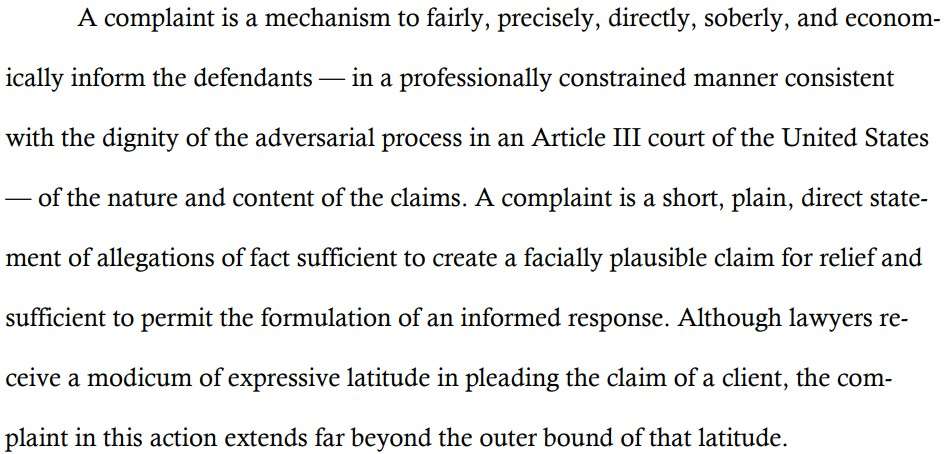By Eugene Volokh
Copyright reason

As every member of the bar of every federal court knows (or is presumed to know), Rule 8(a), Federal Rules of Civil Procedure, requires that a complaint include “a short and plain statement of the claim showing that the pleader is entitled to relief.” Rule 8(e)(1) helpfully adds that “[e]ach averment of a pleading shall be simple, concise, and direct.” Some pleadings are necessarily longer than others. The difference likely depends on the number of parties and claims, the complexity of the governing facts, and the duration and scope of pertinent events. But both a shorter pleading and a longer pleading must comprise “simple, concise, and direct” allegations that offer a “short and plain statement of the claim.” Rule 8 governs every pleading in a federal court, regardless of the amount in controversy, the identity of the parties, the skill or reputation of the counsel, the urgency or importance (real or imagined) of the dispute, or any public interest at issue in the dispute.
In this action, a prominent American citizen (perhaps the most prominent American citizen) alleges defamation by a prominent American newspaper publisher (perhaps the most prominent American newspaper publisher) and by several other corporate and natural persons. Alleging only two simple counts of defamation, the complaint consumes eighty-five pages. Count I appears on page eighty, and Count II appears on page eighty-three. Pages one through seventy-nine, plus part of page eighty, present allegations common to both counts and to all defendants. Each count alleges a claim against each defendant and, apparently, each claim seeks the same remedy against each defendant.
Even under the most generous and lenient application of Rule 8, the complaint is decidedly improper and impermissible. The pleader initially alleges an electoral victory by President Trump “in historic fashion”—by “trouncing” the opponent—and alludes to “persistent election interference from the legacy media, led most notoriously by the New York Times.” The pleader alludes to “the halcyon days” of the newspaper but complains that the newspaper has become a “fullthroated mouthpiece of the Democrat party,” which allegedly resulted in the “deranged endorsement” of President Trump’s principal opponent in the most recent presidential election. The reader of the complaint must labor through allegations, such as “a new journalistic low for the hopelessly compromised and tarnished ‘Gray Lady.'” The reader must endure an allegation of “the desperate need to defame with a partisan spear rather than report with an authentic looking glass” and an allegation that “the false narrative about ‘The Apprentice’ was just the tip of Defendants’ melting iceberg of falsehoods.” Similarly, in one of many, often repetitive, and laudatory (toward President Trump) but superfluous allegations, the pleader states, “‘The Apprentice’ represented the cultural magnitude of President Trump’s singular brilliance, which captured the [Z]eitgeist of our time.”



